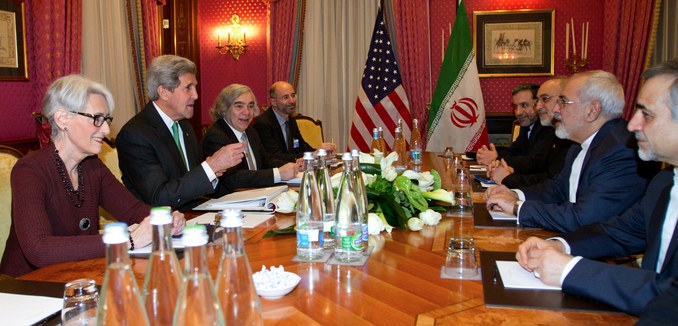There is a third option beyond a bad nuclear deal or war with Iran, Yishai Schwartz argued in a post Tuesday for the Brookings Institution’s Lawfare blog. Schwartz acknowledged the weaknesses in the emerging deal—the sunset provision allowing Iran an unconstrained nuclear program in ten years, the unlikelihood of being able to reimpose sanctions, and Iran’s continued efforts to destabilize the Middle East—and argued that an alternative path could be taken that would strengthen the hands of American negotiators.
The scenario he laid out would be to declare the talks a failure for now, but to stay engaged with Iran while maintaining most of the remaining sanctions.
First, American negotiators would have to allow the current round of negotiations to fail, but without blowing up or reneging on any already-made commitments. Doing so should not be too difficult. There are enough unresolved issues that adopting a hard (and reasonable) line on, say, the timing of sanctions relief or the reach of inspections would either force Iranian capitulation (good) or lead to an impasse—which from this perspective would be fine as well.
Simultaneously, the US would have to engage energetically with other members of the P5+1 to ensure that a such an impasse doesn’t result in the unraveling of existing sanctions. Given current relations with Russia in particular, significantly expanding international sanctions would likely be a stretch, but with the help of the French and the Gulf states, maintaining the existing regime should still be possible. Certainly, it is more likely (and vastly simpler) than re-implementing sanctions in response to an Iranian violation, five or ten years down the line….
But these doomsday predictions aren’t gospel. Functionally, the difference between three months and a year may not be all that significant. Neither window provides enough time to bring serious additional sanctions; both provide the time for a military strike. More importantly, Iran’s interest in avoiding a dramatic escalation is at at least as strong as ours. War would be costly for us, and even more for our regional allies. But it would costliest for Iran. Even short of war, Iran’s interest in avoiding economy-wrecking sanctions of the sort prepared by Senators Kirk and Menendez are as strong today as they were six months or a year ago.
Schwartz dismissed the fear, expressed by proponents of a deal, that that without an agreement Iran will simply make a rush for bomb. He observed that Iran doesn’t want an escalation of sanctions or a military attack. The advantage to holding an occasional “summit and announc[ing] progress” is that it will keep “Iran from a nuclear capability, but never fully [relax] the vise.” Some time in the future, according to Schwartz, when the pressure from the sanctions has eroded Iran’s will it might be possible to “pursue another comprehensive deal on more favorable terms.”
[Photo: United States Mission Geneva / Flickr ]




